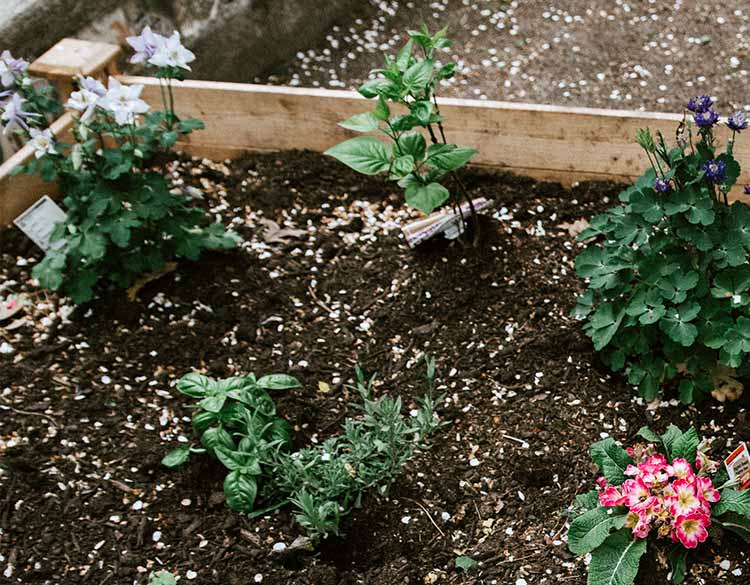Relaxation and stress relief are reasons for many of us to garden. So don’t set unrealistic goals for your first gardening endeavor. Keep it simple, find a modest goal and aim for that.
Just getting outdoors can actually improve your mood. Sunlight and the fresh air and just to keep active are good for your health.
We spend so much time indoors at work, watching TV, etc. So if you feel urge to connect with nature, having a piece of nature right outside your door can help you feel some of this connection easily. Being in touch with nature and outdoors can easily help you feel more stress-free.
Start small
It’s crucial for beginning gardeners and those who want to reduce stress in their lives by gardening to start small.
A small garden which is easy to use can get you comfortably started on your gardening journey. It can help to decide whether you are a digger and like to dig in the dirt. It can help you find out whether you want to grow your own food or grow plants solely for their elegance.
Making big time and money investments to your garden require a lot of work. It can make your garden hobby feel more like a duty than enjoyment. And it was meant to be stress-free space in your life…

There are 5 points you need to recognize as you plan your stress-free small garden.
1. Mulch helps keep weeds out
You can easily spend too much time and effort just for watering and pulling weeds. One way to overcome this work is to add a 2…3-inch layer of mulch. Mulch is usually organic in nature.
Mulch over your garden space will stop weeds from spreading. Mulch helps the garden soil keep its moisture longer by slowing the evaporation process during hot days. Organic mulches will improve the ground when they decompose.
Inorganic mulches, such as plastic landscape fabrics, stones, and gravel chips, are longer lasting and odorless. They won’t have the same benefits as they don’t add nutrients to your soil. They may also prevent water and nutrients from reaching the roots and can suffocate your plants.
2. Plants according the location
Choosing the right plants is also a great way to get rid of extra work. This will serve you as a beginner as it will give you a taste if you are willing to continue gardening or not.
You should start by evaluating the space and its condition for gardening. Get help from gardening experts if you are not sure how to use that space.
If you choose plants that are not suitable for your climate or soil, it can be an expensive and time-consuming start for your gardening hobby. And that’s what we are trying to avoid.
Look at your space and check if it’s sunny most of the day. If, then concentrate on plants suitable for that. Make sure not to forget the shady spots. They are perfect for specific plants and flowers. Make use of the whole space by choosing the right plants for the right location.
3. Watering with ease by timers and soaker hoses
Watering the garden during the hot days of summer can be a task not appalling to you. Soaker hose helps to decrease the issue of hauling water or a hose to your garden. You won’t have as much pain with evaporation as it will water slowly and evenly.
By attaching a timer to your garden hose, you won’t even have to worry about turning on the water. That’s the easiest it can get.
If you choose container gardening or pot gardening (growing plants in containers instead of planting them in the ground), examine a drip-irrigation system. Drip-irrigation saves water by providing water slowly to the roots of plants. You can get those systems from your local garden store, and they are easy to install. You’ll never have to worry about the duty of watering yourself.

4. Pull out those weeds
A weed is a plant considered undesirable in a particular situation. Weeds can become a problem in your garden. Weed killers contain potentially harmful chemicals. So instead of chemicals, stay active by pulling the weeds out when they’re young and small.
Deadheading your plants is also an excellent way to support a stress-free garden. Deadheading means the removal of dead or spent flowers from living plants. It’s always good for your plants, and for you, as it means more flowers.
Flowers, especially, help you to keep your garden looking fresh and beautiful. But most herbs lose their fascination as they fade, spoiling the overall freshness of a garden or individual plants. So you need you to take the time to clip or deadhead faded flowers. It can result in healthier plants as it enhances the flowering performance of many perennials.
5. Edging to give a structure and shape
Edging helps you to give a structure and shape for your garden. Without a proper border and base, your garden will spread and sprawl, creating a feeling of chaos.
Edging as a garden maneuver will save you time and effort by preventing grass from penetrating to your garden beds.
You can use edging in the form of plastic, bricks, and stone. The most effective is the one you place up to 6-inches beneath the soil to prevent grass from creeping under your garden.
Excellent way to prevent heavy garden maintenance are raised garden beds. They are relatively easy to build, and easier to maintain. You can buy a kit, or make your own. It is basically a large wooden container that sits above ground and is filled with soil and plants. Raised garden beds are also useful if you have limitations in movement. You don’t need to bend or squat on the ground to tend your garden.

